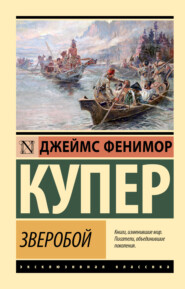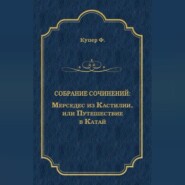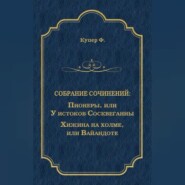По всем вопросам обращайтесь на: info@litportal.ru
(©) 2003-2025.
✖
The Last of the Mohicans
Настройки чтения
Размер шрифта
Высота строк
Поля
‘What is it?’ repeated Heyward, aloud.
Neither Hawkeye nor the Indians made any reply. They listened, as if expecting the sound would be repeated, with a manner that expressed their own astonishment. At length they spoke together earnestly, in the Delaware language, when Uncas, passing by the inner and most concealed aperture, cautiously left the cavern. When he had gone, the scout first spoke in English.
‘What it is, or what it is not, none here can tell; though two of us have ranged the woods for more than thirty years! I did believe there was no cry that Indian or beast could make that my ears had not heard; but this has proved that I was only a vain and conceited mortal!’
Was it not, then, the shout the warriors make when they wish to intimidate their enemies?’ asked Cora, who stood drawing her veil about her person, with a calmness to which her agitated sister was a stranger.
‘No, no; this was bad, and shocking, and had a sort of unhuman sound; but when you once hear the war-whoop, you will never mistake it for anything else! Well, Uncas!’ speaking in Delaware to the young chief as he re-entered, ‘what see you? Do our lights shine through the blankets?’
The answer was short, and apparently decided, being given in the same tongue.
‘There is nothing to be seen without,’ continued Hawkeye, shaking his head in discontent; ‘and our hiding-place is still in darkness! Pass into the other cave, you that need it, and seek for sleep; we must be a-foot long before the sun and make the most of our time to get to Edward, while the Mingoes are taking their morning nap.’
Cora set the example of compliance, with a steadiness that taught the more timid Alice the necessity of obedience. Before leaving the place, however, she whispered a request to Duncan that he would follow. Uncas raised the blanket for their passage, and as the sisters turned to thank him for this act of attention, they saw the scout seated again before the dying embers, with his face resting on his hands, in a manner which showed how deeply he brooded on the unaccountable interruption which had broken up their evening devotions.
Heyward took with him a blazing knot, which threw a dim light through the narrow vista of their new apartment. Placing it in a favourable position, he joined the females, who now found themselves alone with him for the first time since they had left the friendly ramparts of Fort Edward.
‘Leave us not, Duncan,’ said Alice; ‘we cannot sleep in such a place as this, with that horrid cry still ringing in our ears!’
‘First let us examine into the security of your fortress,’ he answered, ‘and then we will speak of rest.’
He approached the farther end of the cavern, to an outlet, which, like the others, was concealed by blankets, and removing the thick screen, breathed the fresh and reviving air from the cataract. One arm of the river flowed through a deep, narrow ravine, which its current had worn in the soft rock directly beneath his feet, forming an effectual defence, as he believed, against any danger from that quarter; the water, a few rods above them plunging, glancing, and sweeping along, in its most violent and broken manner.
‘Nature has made an impenetrable barrier on this side,’ he continued, pointing down the perpendicular declivity into the dark current, before he dropped the blanket; ‘and as you know that good men and true are on guard in front, I see no reason why the advice of our honest host should be disregarded. I am certain Cora will join me in saying that sleep is necessary to you both.’
‘Cora may submit to the justice of your opinion, though she cannot put it into practice,’ returned the elder sister, who had placed herself by the side of Alice, on a couch of sassafras; ‘there would be other causes to chase away sleep, though we had been spared the shock of this mysterious noise. Ask yourself, Heyward, can daughters forget the anxiety a father must endure, whose children lodge, he knows not where or how, in such a wilderness, and in the midst of so many perils?’
‘He is a soldier and knows how to estimate the chances of the woods.’
‘He is a father, and cannot deny his nature.’
‘How kind has he ever been to all my follies! how tender and indulgent to all my wishes!’ sobbed Alice. ‘We have been selfish, sister, in urging our visit at such hazard!’
‘I may have been rash in pressing his consent in a moment of much embarrassment, but I would have proved to him, that however others might neglect him in his strait his children at least were faithful!’
‘When he heard of your arrival at Edward,’ said Heyward, kindly, ‘there was a powerful struggle in his bosom between fear and love; though the latter, heightened, if possible, by so long a separation, quickly prevailed. “It is the spirit of my noble-minded Cora that leads them, Duncan,” he said, “and I will not baulk it. I only wish that he who holds the honour of our royal master in his guardianship, would show but half her firmness!”’
‘And did he not speak of me, Heyward?’ demanded Alice, with jealous affection. ‘Surely, he forgot not altogether his little Elsie?’
‘That were impossible,’ returned the young man; ‘he called you by a thousand endearing epithets, that I may not presume to use, but to the justice of which I can warmly testify. Once, indeed, he said—’
Duncan ceased speaking; for while his eyes were riveted on those of Alice, who had turned towards him with the eagerness of filial affection, to catch his words, the same strong, horrid cry, as before, filled the air, and rendered him mute. A long, breathless silence succeeded, during which each looked at the others in fearful expectation of hearing the sound repeated. At length the blanket was slowly raised, and the scout stood in the aperture, with a countenance whose firmness evidently began to give way before a mystery that seemed to threaten some danger, against which all his cunning and experience might prove of no avail.
(#ulink_40df95aa-7a8d-56eb-9745-db297216434e) In vulgar parlance the condiments of a repast are called by the American ‘a relish,’ substituting the thing for its effect. These provincial terms are frequently put into the mouths of the speakers, according to their several conditions in life. Most of them are of local use, and others quite peculiar to the particular class of men to which the character belongs. In the present instance, the scout uses the word with immediate reference to the ‘salt,’ with which his own party was so fortunate as to be provided.
(#ulink_48f94de4-2ffd-5363-92ec-0882696eb466) Glenn’s Falls are on the Hudson, some forty or fifty miles above the head of tide, or the place where that river becomes navigable for sloops. The description of this picturesque and remarkable little cataract, as given by the scout, is sufficiently correct, though the application of the water to the uses of civilised life has materially injured its beauties. The rocky island and the two caverns are well known to every traveller since the former sustains a pier of a bridge which is now thrown across the river, immediately above the fall. In explanation of the taste of Hawkeye, it should be remembered that men always prize that most which is least enjoyed. Thus, in a new country, the woods and other objects, which in an old country would be maintained at great cost, are got rid of, simply with a view of ‘improving,’ as it is called.
(#ulink_7cf06944-4917-5ad2-b93b-2833ee7c3e5f) See Appendix, Note E.
CHAPTER 7 (#ulink_a1e1d66c-d1b5-51c0-ae0e-d801f87a7f7e)
They do not sleep.
On yonder cliffs, a grisly band,
I see them sit.
—Gray.
‘‘Twould be neglecting a warning that is given for our good, to lie hid any longer,’ said Hawkeye, ‘when such sounds are raised in the forest! The gentle ones may keep close, but the Mohicans and I will watch upon the rock, where I suppose a major of the 60th would wish to keep us company.’
‘Is then our danger so pressing?’ asked Cora.
‘He who makes strange sounds, and gives them out for man’s information, alone knows our danger. I should think myself wicked, unto rebellion against His will, was I to burrow with such warnings in the air! Even the weak soul who passes his days in singing is stirred by the cry, and, as he says, is “ready to go forth to the battle.” If ‘twere only a battle, it would be a thing understood by us all, and easily managed; but I have heard that when such shrieks are atween heaven and ‘arth it betokens another sort of warfare!’
‘If all our reasons for fear, my friend, are confined to such as proceed from supernatural causes, we have but little occasion to be alarmed,’ continued the undisturbed Cora; ‘are you certain that our enemies have not invented some new and ingenious method to strike with terror, that their conquest may become more easy?’
‘Lady,’ returned the scout, solemnly, ‘I have listened to all the sounds of the woods for thirty years, as a man will listen whose life and death depend on the quickness of his ears. There is no whine of the panther, no whistle of the cat-bird, nor any invention of the devilish Mingoes, that can cheat me! I have heard the forest moan like mortal men in their affliction; often, and again, have I listened to the wind playing its music in the branches of the girdled trees; and I have heard the lightning cracking in the air, like the snapping of blazing brush, as it spitted forth sparks and forked flames; but never have I thought that I heard more than the pleasure of Him who sported with the things of His hand. But neither the Mohicans, nor I, who am a white man without a cross, can explain the cry just heard. We, therefore, believe it a sign for our good.’
‘It is extraordinary!’ said Heyward, taking his pistols from the place where he had laid them on entering; ‘be it a sign of peace or a signal of war, it must be looked to. Lead the way, my friend; I follow.’
On issuing from their place of confinement, the whole party instantly experienced a grateful renovation of spirits, by exchanging the pent air of the hiding-place for the cool and invigorating atmosphere which played around the whirlpools and pitches of the cataract. A heavy evening breeze swept along the surface of the river, and seemed to drive the roar of the falls into the recesses of their own caverns, whence it issued heavily and constant, like thunder rumbling beyond the distant hills. The moon had risen, and its light was already glancing here and there on the waters above them; but the extremity of the rock where they stood still lay in shadow. With the exception of the sounds produced by the rushing waters, and an occasional breathing of the air, as it murmured past them in fitful currents, the scene was as still as night and solitude could make it. In vain were the eyes of each individual bent along the opposite shores, in quest of some signs of life that might explain the nature of the interruption they had heard. Their anxious and eager looks were baffled by the deceptive light, or rested only on naked rocks, and straight and immovable trees.
‘Here is nothing to be seen but the gloom and quiet of a lovely evening,’ whispered Duncan; ‘how much should we prize such a scene, and all this breathing solitude, at any other moment, Cora! Fancy yourselves in security, and what now, perhaps, increases your terror, may be made conducive to enjoyment—’
‘Listen!’ interrupted Alice.
The caution was unnecessary. Once more the same sound arose, as if from the bed of the river, and having broken out of the narrow bounds of the cliffs, was heard undulating through the forest, in distant and dying cadences.
‘Can any here give a name to such a cry?’ demanded Hawkeye, when the last echo was lost in the woods; ‘if so, let him speak; for myself, I judge it not to belong to ‘arth!’
‘Here, then, is one who can undeceive you,’ said Duncan; ‘I know the sound full well, for often have I heard it on the field of battle, and in situations which are frequent in a soldier’s life. ’Tis the horrid shriek that a horse will give in his agony; oftener drawn from him in pain, though sometimes in terror. My charger is either a prey to the beasts of the forest, or he sees his danger, without the power to avoid it. The sound might deceive me in the cavern, but in the open air I know it too well to be wrong.’
The scout and his companions listened to this simple explanation with the interest of men who imbibe new ideas, at the same time that they get rid of old ones, which have proved disagreeable inmates. The two latter uttered their usual and expressive exclamation, ‘Hugh!’ as the truth first glanced upon their minds, while the former, after a short musing pause, took upon himself to reply.
‘I cannot deny your words,’ he said; ‘for I am little skilled in horses, though born where they abound. The wolves must be hovering above their heads on the bank, and the timorsome creatures are calling on man for help, in the best manner they are able. Uncas’—he spoke in Delaware—’Uncas, drop down in the canoe, and whirl a brand among the pack; or fear may do what the wolves can’t get at to perform, and leave us without horses in the morning, when we shall have so much need to journey swiftly!’
The young native had already descended to the water, to comply, when a long howl was raised on the edge of the river, and borne swiftly off into the depths of the forest, as though the beasts, of their own accord, were abandoning their prey in sudden terror. Uncas, with instinctive quickness, receded, and the three foresters held another of their low, earnest conferences.
‘We have been like hunters who have lost the points of the heavens, and from whom the sun has been hid for days,’ said Hawkeye, turning away from his companions; ‘now we begin again to know the signs of our course, and the paths are cleared from briars! Seat yourselves in the shade which the moon throws from yonder beech—’tis thicker than that of the pines—and let us wait for that which the Lord may choose to send next. Let all your conversation be in whispers; though it would be better, and perhaps, in the end, wiser, if each one held discourse with his own thoughts for a time.’
The manner of the scout was seriously impressive, though no longer distinguished by any signs of unmanly apprehension. It was evident that his momentary weakness had vanished with the explanation of a mystery which his own experience had not served to fathom; and though he now felt all the realities of their actual condition, that he was prepared to meet them with the energy of his hardy nature. This feeling seemed also common to the natives, who placed themselves in positions which commanded a full view of both shores, while their own persons were effectually concealed from observation. In such circumstances, common prudence dictated that Heyward and his companions should imitate a caution that proceeded from so intelligent a source. The young man drew a pile of sassafras from the cave, and placing it in the chasm which separated the two caverns, it was occupied by the sisters, who were thus protected by the rocks from any missiles, while their anxiety was relieved by the assurance that no danger could approach without a warning. Heyward himself was posted at hand, so near that he might communicate with his companions without raising his voice to a dangerous elevation, while David, in imitation of the woodsmen, bestowed his person in such a manner among the fissures of the rocks, that his ungainly limbs were no longer offensive to the eye.
In this manner hours passed by without further interruption. The moon reached the zenith, and shed its mild light perpendicularly on the lovely sight of the sisters slumbering peacefully in each other’s arms. Duncan cast the wide shawl of Cora before a spectacle he so much loved to contemplate, and then suffered his own head to seek a pillow on the rock. David began to utter sounds that would have shocked his delicate organs in more wakeful moments; in short, all but Hawkeye and the Mohicans lost every idea of consciousness, in uncontrollable drowsiness. But the watchfulness of these vigilant protectors neither tired nor slumbered. Immovable as that rock, of which each appeared to form a part, they lay, with their eyes roving, without intermission, along the dark margin of trees that bounded the adjacent shores of the narrow stream. Not a sound escaped them; the most subtle examination could not have told they breathed. It was evident that this excess of caution proceeded from an experience that no subtlety on the part of their enemies could deceive. It was, however, continued without any apparent consequences, until the moon had set, and a pale streak above the tree-tops, at the bend of the river a little below, announced the approach of day.
Then, for the first time, Hawkeye was seen to stir. He crawled along the rock, and shook Duncan from his heavy slumbers.
‘Now is the time to journey,’ he whispered; ‘awake the gentle ones, and be ready to get into the canoe when I bring it to the landing-place.’

















